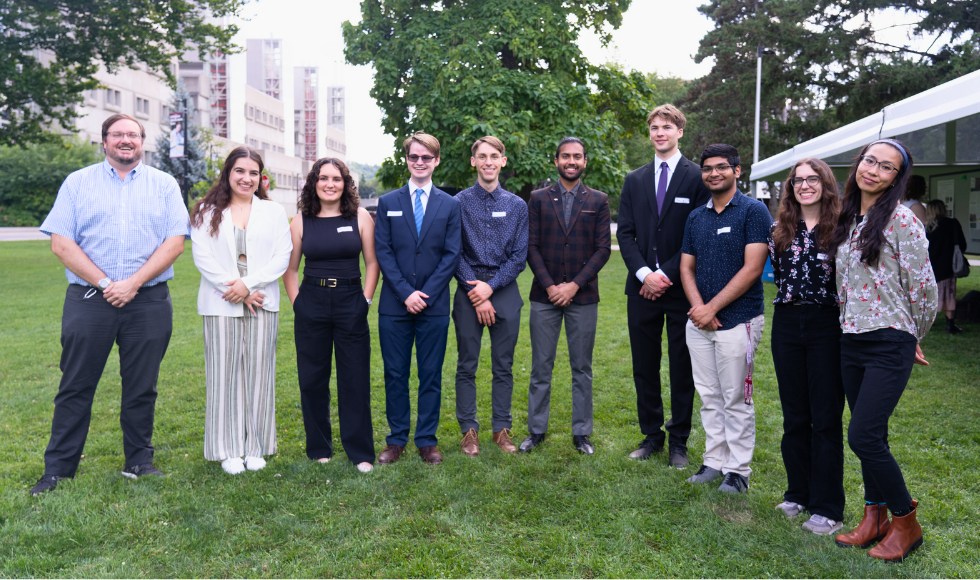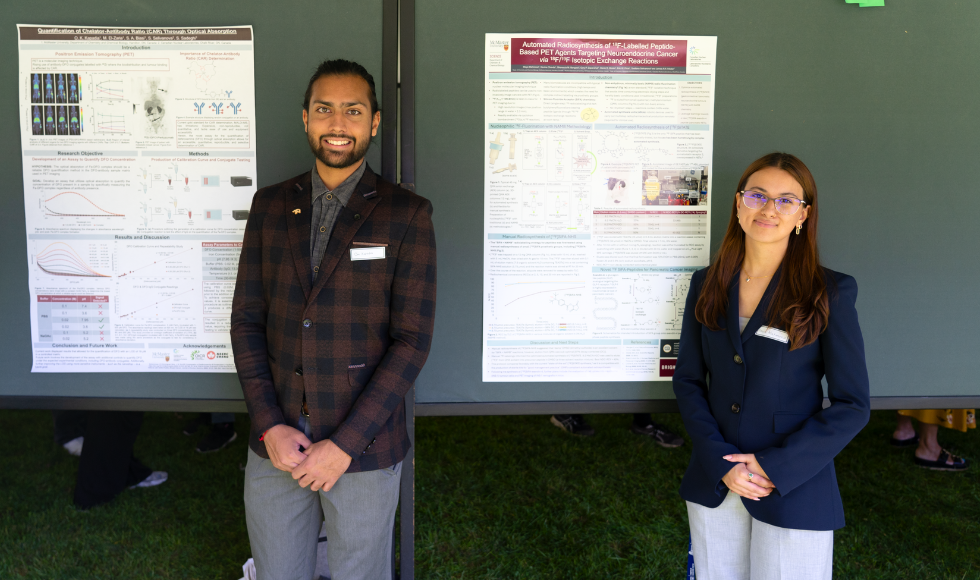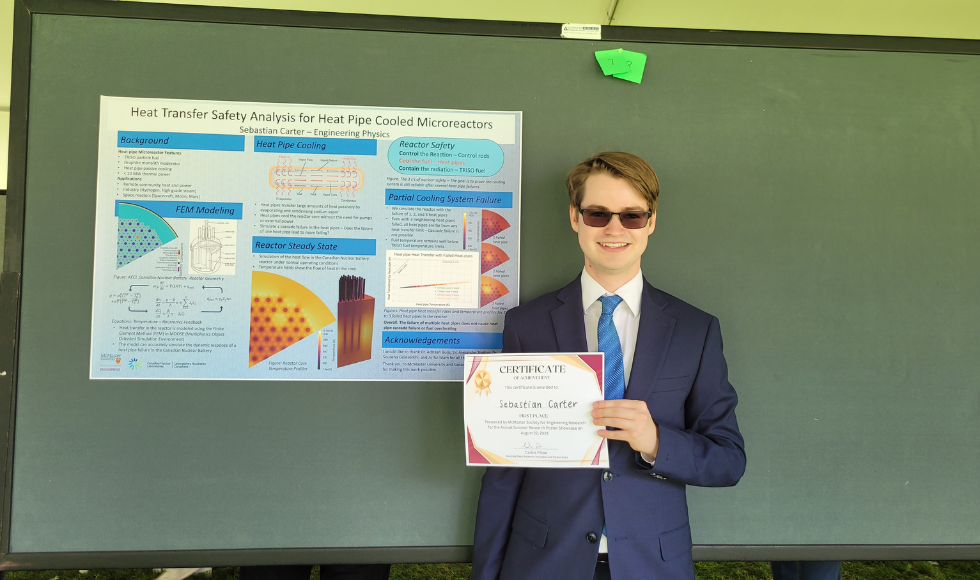Undergrads gain nuclear research experience in summer program

McMaster science and engineering students shared their nuclear research projects at the Faculty of Engineering Summer Research Poster Showcase.
BY Daniella Fiorentino
August 23, 2024
Twelve McMaster undergraduate students gained hands-on nuclear research experience this summer as part of the CNL Nuclear Undergraduate Research Experience program.
Hosted by McMaster University, Canadian Nuclear Laboratories (CNL) and Atomic Energy of Canada Limited (AECL), the program enables students enrolled in Level II or above in the Faculties of Engineering and Science to develop research and technical skills in the nuclear field.
During the eight-week program, students spent time at McMaster and CNL’s nuclear facilities, where they conducted research that has the potential to shape how we power our homes, diagnose and treat disease and study materials at the atomic level.
The program’s 2024 cohort included seven students from the Faculty of Engineering and five from the Faculty of Science.
Nuclear innovation for the future
Nuclear research underpins advancements across a wide range of sectors — from health and medicine to energy, materials, safety and security.
With access to cutting-edge nuclear research infrastructure and expertise at both McMaster and CNL, students had a chance to lead research on Positron Emission Tomography (PET) imaging agents, small modular reactors, quantum materials and more — while developing skills and building connections that can kick-start their careers.
Engineering physics student Becca Barbera conducted research on neutron irradiation and TRISO Particles — a next-generation nuclear fuel that is expected to revolutionize reactor technologies.
“My experience with this program was very enriching. It allowed me to dive into advanced nuclear engineering topics, explore innovative research areas, and connect with leading industry professionals,” says Barbera.
“The program not only broadened my technical knowledge, but also provided invaluable networking opportunities, helping me build a strong foundation for my future endeavours in nuclear research.”

Learning from the experts
The next generation of leaders in nuclear will play a critical role in finding solutions to pressing global challenges — and what better way to prepare for a career in nuclear than to learn from the experts themselves. Students were paired with researcher-mentors from CNL and McMaster who are currently leading studies in their fields.
Pat Clancy, an assistant professor in the Department of Physics and Astronomy, mentored Daniel Neumoin and Sanjit Patil. Both students’ projects focused on investigating the properties of materials using neutron beams — an area of study that underpins a range of technological solutions, from quantum materials and superconductors to hydrogen storage, battery technology and more.
“It was great to give Daniel and Sanjit an opportunity to work with neutron beamlines, drive their own research projects, and discover how neutrons can be used to tackle real materials challenges,” he says, noting that the McMaster Nuclear Reactor is one of the only facilities in Canada that can be used for this type of research.
“This kind of experience is incredibly valuable for sparking an interest in nuclear science and technology, especially for undergrads in the early stages of their careers. By partnering with CNL, we not only give these students a chance to develop important research and professional skills; we also get the chance to build new research collaborations and introduce our students to more of what the nuclear industry has to offer.”

Biochemist Marilyne Stuart, who leads the Environmental Biology and Toxicology team at Canadian Nuclear Laboratories, has mentored a total of three students over the two years of the program.
This year, her student’s project aimed to understand potential environmental impacts related to the deployment of small modular reactors, or SMRs. Identifying the potential environmental impacts of building and operating a nuclear facility is a key step in the siting process and, overall, supports environmental stewardship and sustainability.
“This program, this collaboration, is really the perfect example of a symbiotic relationship with our shared research interests tying us together, the students teach my team and I fresh, new perspectives on a variety of topics within environmental biology and toxicology. And, in return, we share our own experiences, ideas, and visions with them,” says Stuart.
“I’ve truly enjoyed working with the McMaster students over these past years, and I hope they returned to their studies feeling inspired to learn, explore, and create — perhaps even beyond what they previously thought was possible!”
The next generation of nuclear industry leaders
Erica Dao, Manager of Nuclear Outreach and Education, says the summer program is the perfect opportunity for students to develop new skills and explore potential career paths in the nuclear industry.
“Our students have accomplished incredible work this summer. They’ve applied their in-class studies and passion for nuclear science to real-world research projects with impacts in health and medicine, clean energy, materials science and nuclear safety,” she says.
“McMaster is proud to be home to the next generation of nuclear industry leaders whose talent and dedication will be instrumental to the creation of a more sustainable, healthier planet.”


